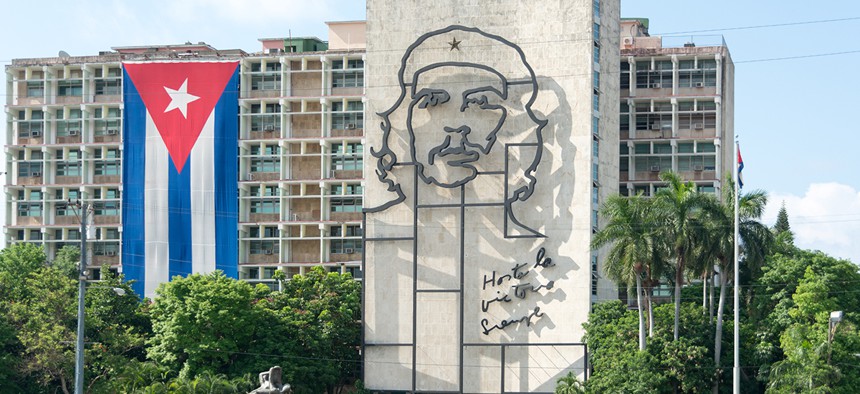
Cuba's Ministry of the Interior building features an iron mural of Che Guevara. rmnoa357 / Shutterstock.com
White House Backs Removing Cuba From State Sponsors of Terrorism List
The White House announced that the president submitted a report to Congress that would remove Cuba from the State Sponsors of Terrorism List.
President Obama has sent a report to Congress calling for the removal of Cuba from the State Sponsors of Terrorism List.
Cuba has been on the list since 1982, which also includes Iran, Sudan, and Syria. The State Department completed a review on whether Cuba should be removed from the list Thursday. It then went through an interagency process before reaching the president. The recommendation certifies that Cuba has not provided support to terrorist groups in the last six months, and ensures that it will not do so in the future.
"After a careful review of Cuba's record, which was informed by the Intelligence Community, as well as assurances provided by the Cuban government, the Secretary of State concluded that Cuba met the conditions for rescinding its designation as a State Sponsor of Terrorism," said White House Press Secretary Josh Earnest in a statement. "The Secretary of State therefore recommended that the President make and submit to Congress the statutorily-required report and certification."
In an interview with NPR last week, Obama suggested that a conclusion on Cuba's spot on the U.S. list of state sponsors of terrorism was near. "Understand that the criteria is very straightforward: 'Is this particular country considered a state sponsor of terrorism,' not, 'do we agree with them on everything,' not whether they engage in repressive or authoritarian activities in their own country," he said. "I think there's a real opportunity here, and we are going to continue to move forward on it." The president is now tasked with sending a report to Congress, which will then have 45 days to review the decision and decide whether to try to block it with a joint resolution.
Restoring relations with Cuba has been a point of contention between members of Congress and the administration since the diplomatic breakthrough. However, it is unlikely the president's decision would be blocked. While there is strong opposition to restoring ties with Cuba, there likely would not be enough votes to stand in the way of the president's decision.
But the critics on the Hill are likely to be loud. Last week, New Jersey Sen. Robert Menendez, who has been a critic of normalizing relations with Cuba, issued a statement saying that "a recommendation to remove Cuba from the list of State Sponsors of Terrorism would represent another significant misstep in a misguided policy, and it is both discouraging and alarming to read about unwarranted pressure from the White House to rush the State Department's review process."
House Speaker John Boehner last week highlighted violence against a group of Cuban democracy leaders ahead of the summit, saying the incident "raises serious questions about the wisdom of revisiting diplomatic relations with Cuba and removing the country from the State Department's list of state sponsors of terror while this dictatorship, which practices repression at home and supports violence throughout the region, continues to hold power."
Since resetting relations with Cuba, Obama has introduced regulations to ease exchanges, like travel, to Cuba. The removal of Cuba from the State Sponsors of Terrorism List would continue to open that door in relieving some financial sanctions against the country. But the embargo, which was officially put in place in 1962, remains. While the president can soften some restrictions under the embargo through executive authority, only Congress can lift it.
(Image via rmnoa357/Shutterstock.com)







